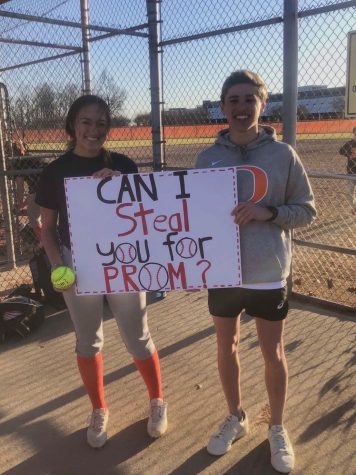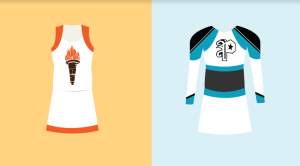A Year Cut Short
April 30, 2020
The school year an exchange student is involved in is always a memorable time. While being thousands of miles from home, memories and friendships that will last a lifetime are made. Opportunities are given to these students that they might not have the chance to experience in their home country, such as sports, school activities and other different events.
German exchange students Paul Robl and Fabio Nihilani both took part in the lives of students at East.
“I was part of the school’s football and wrestling team, two of the greatest memories I’ve ever made,” Robl said. “I was also involved with a local political party that my host dad was part of.”
The American high school experience gives an insight on the government. Due to this, exchange students are able to interact with and decipher the differences and similarities between two countries.
“The U.S. system is built on individualism and trying to allow each student to find their own pathway, whereas Germany is focussed on more traditional values and having a certain standard of general education,” Robl said. “Germany does not support athletics on such a high level as the U.S. does, as sports is practiced in independent clubs rather than schools.”
“The United states education system certainly has a definite culture around athletics and sports that I appreciate,” Robl said.
Depending on where the exchange student is from, they are able to experience differences that they might enjoy.
“The best thing about America is definitely the people who are very outgoing and easy to become friends with,” Nihilani said, “Another thing I liked is the fact that you are allowed to drive when you are 16, and not 18 like it is in Germany.”
There are also other differences between an exchange student’s two countries that are not as likeable.
“I did not really like the way that the U.S. is dealing with topics like climate change and things like that, because the U.S. has such a big impact on it,” Nihilani said, “I think except for that there is nothing that I really didn’t like, except for the fact that I had to leave early.”
The outbreak of the coronavirus has left a devastating impact on everyone, from grocery stores struggling to keep their customers under control to healthcare personnel not always being provided proper safety equipment. While these issues are more focused on hospitals and the community, the impact of the virus can be traced to personal bonds.
Exchange students everywhere were required to return home and end their visiting school year early. Too-soon goodbyes were unwillingly made and friendship bonds forced to suddenly stretch across multiple countries all at once.
“It’s disappointing, especially the last few months of the exchange year tend to be especially exciting, as you start to get really close with your friends and make great memories,” Robl said. “Having that taken away is extremely disheartening.”
Robl and Nihilani were both unable to finish their junior year at East. This disappointing outcome hurt their host families, friends, coaches and teachers. Not being able to say a proper goodbye was a disappointment to everyone.
“Getting to spend time in a place abroad creates a certain bond to that place. Columbus is very close to my heart,” Nihilani said. “The friends I made are connections that I hopefully will keep for the rest of my life.”
The fight against the novel coronavirus has been a tiring one all around the world. As the death toll reaches 88,000, the battle is far from over. Exchange students were able to step out of one country and back into their home one. This way, they were able to view how both were handling the outbreak during this unfamiliar time.
“Germany is really trying to fight this virus as one nation without blaming each other for a shortage of masks or other medical equipment, like it is happening currently between President Trump and several hospitals in California, Oregon and New York,” Nihilani said. “Companies change their production progress to make masks and ventilators voluntarily without getting forced to by laws, like it is happening in the U.S. To be honest, both countries have reacted way too late to prevent thousands of deaths.”
All countries are being affected by the overwhelming pandemic. How the countries deal with the outbreak, however, is up to them.
“Germany treated everything more radically, as my home city of Munich is on lockdown since about a week ago and enforcing this lockdown with harsh penalties,” Robl said. “The German government took drastic measures very quickly, which the U.S. government has yet to do.”
Germany’s death toll is low compared to other countries. This is due to the country creating the “corona taxis.” These are medics equipped with protective gear who drive down streets, visiting the infected and testing those who are not. The corona taxis are also able to suggest hospitalization. By taking this measure, the virus is able to be contained.
In the U.S., many are still leaving their houses and socializing. In Germany, for example, cars get a ticket for having more than two people in a care, besides family. In other countries, residents are being fined alone for being outside of their home. In reality, the U.S. has yet to enact harsher restrictions.
“This experience shows the world that we have to be more prepared for a worldwide pandemic and that all of the countries have to work as a team to fight a virus,” Nihlani said. “Furthermore it shows weaknesses in each healthcare system like shortages of nurses, ventilators and the number of intensive-care beds.”
With weaknesses in how the world handled this pandemic blown open, there is a more likely chance the government will be able to fix them. Exchange students had the opportunity to see the difference in person with how countries handled their fight. In the future, the next pandemic will hopefully be handled with stronger hands. For right now, remember to stay safe and healthy.










